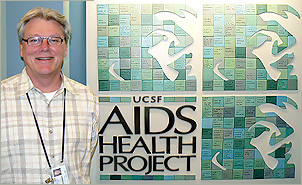 |
| James Dilley |
by Sharon Brock
More than 40 Bay Area AIDS service organizations are beneficiaries of the 20th Annual AIDS Walk San Francisco on July 16. Last year, more than 25,000 people walked the 10-kilometer (6.2-mile) course in Golden Gate Park and raised more than $3.6 million.
One organization that has received funds every year is the UCSF-affiliated AIDS Health Project (AHP), which offers free HIV-related mental health services, such as HIV testing and counseling, prevention workshops and support groups. AHP also offers training and education for mental health care providers from across the state.
Since its inception in 1984, AHP has provided services to more than 225,000 people with HIV or at risk for HIV and to their providers. The project's mission is not only to reach out to the public to educate and stop the spread of HIV infection, but to help people who are already infected to face the emotional, psychological and social challenges of living with HIV. AHP is a part of the San Francisco HIV Services Partnership, along with the San Francisco AIDS Foundation and the Shanti Project.
AHP was co-founded by UCSF psychiatrist James W. Dilley, MD, who first established the program at San Francisco General Hospital in response to the high number of patients with HIV in the early 1980s.
"When HIV patients started coming in, it was a disaster because there was not a lot of information about the disease and everyone was so afraid," said Dilley. "Not only did I help patients with fear and depression, but I ran support groups for nurses because patients were dying left and right."
Over the years, the project has expanded from a hospital-based consulting service to what is now the largest HIV-related mental health agency in San Francisco. Today, the majority of the programs take place at the AHP Services Center, located on Market Street in San Francisco. Last year, the 105-member staff provided HIV testing and counseling to nearly 7,000 people and trained 2,200 providers in HIV-related mental health care.
Intensive case management and professional psychotherapy are also provided for clients who struggle with HIV-positive symptoms and homelessness, mental illness and/or substance abuse. This year, 64 clients are in this program, and crisis management-trained psychiatrists and social workers help them find housing, manage their medications and enroll in substance abuse support groups.
"Because of the psychological and social aspects of this epidemic, such as stigmas against gay lifestyles, support groups bring together people who've experienced isolation from their families and friends," said Dilley. "Some people have been in groups for over 10 years, and they've created friendships and they support each other in moving forward and making positive life choices."
More than 200 volunteers facilitate the 40 support groups that are held every week at the AHP Services Center. The groups are specialized to meet the specific needs of HIV-positive clients, such as those who were recently diagnosed, clients who need support with substance abuse and recovery, and those considering going back to work.
AHP also offers a prevention program called REACH (Risk Evaluation and Counseling for Health) designed for HIV-negative and untested gay and bisexual men. These groups discuss dating, sex, relationships, isolation and other HIV-related issues. The goal is for seronegative men who are concerned about HIV to learn the communication skills to talk to potential partners about HIV status and safe sex practices.
Dilley explained that when antiretroviral drugs were introduced in the mid-1990s and HIV suddenly became a chronic, yet manageable disease, some people became less cautious and incidence rates increased. Only in the last couple of years has the rate of new HIV cases begun to fall.
"My biggest concern is prevention because this is a complex, behavioral disease," said Dilley. "Since promiscuity is a way to deal with isolation and loneliness, prevention is not straightforward. So, we take a behavioral approach to mental health care, and we focus on education and prevention to stop the spread of HIV."
To help raise money so that organizations such as AHP can continue to offer free HIV-related services to the San Francisco community,
join one of the UCSF teams.
If you're unable to walk but want to make a donation, go to the UCSF Friends and Family Team and
make a General Team Donation.
Links:
UCSF AIDS Health Project
San Francisco AIDS WALK

